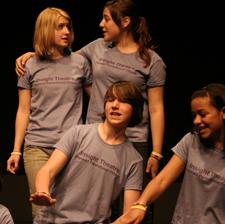An audience of grade seven and eight students sit rapt at a west-end elementary school.
On stage, a dynamic group of high school-aged youth are bursting with energy as they perform a theatrical show. There is a song about masturbation, a scene about sexual orientation, a scene where ninjas talk about different methods of contraception, amongst many others. This is Insight Theatre.
The troupe, sponsored by Planned Parenthood Ottawa, has been in existence for 27 years. Each year, a new cast performs a show that is designed by them. The goal? To educate their peers about sexual and social health.
After auditioning for the troupe, the youth spend two nights per week over the summer months attending training. Half of their time is spent working on the theatre skills they will need, and the other half is spent being given the information they will need to create the scenes, by way of members of community organizations who come to give them seminars.
At the end of the summer, the troupe is cut down to the performance group, who then spend the first two months of the school year creating all the scenes which will form the show. Then, they go on tour, performing at schools, conferences and community events.
The show is presented as a series of sketch-style scenes, often using humour. But the troupe members take their interaction with audiences, and the info they convey, very seriously. gay and lesbian issues are prevalent throughout the show, and cast members say that this was done deliberately. They drew on their own lives and the lives of their friends for the material.
“To get the ideas, some people in the troupe or people that we knew had gone through this stuff, so we thought that it was important to talk about [queer issues] and let everyone know,” says troupe member Shelby Palamar. She adds that the cast tried not to inadvertently put stereotypically gay or lesbian characters on stage.
“Sometimes it’s a little hard not to create stereotypes, because they’re all around us. But we got used to the idea of not telling things as stereotypical, and we made it so that it’s inclusive of everyone,” explains Shebana Lakhani, another teenaged cast member.
Troupe coordinator Jenn Hunnisett says that she and the drama coach make a special point of watching what’s going on as the youth create the show, in order to weed out any potentially offensive representations on stage. She says, however, that the youth generally know what messages they want to convey, and they’re openminded teens.
“The drama coach and I definitely watch for stereotypes, because that takes away from being inclusive, which can be tough. Those messages are not what we want to get across. It’s just about being inclusive and about everybody feeling welcome and being able to express their relationships openly and be accepted and have safer sex information,” says Hunnisett.
The show is laced with characters who are straight, gay, bi, questioning, and trans. Rather than have specific scenes which are denoted “the gay” scenes, queer characters simply appear throughout the show, whether the scene is about sexual orientation, relationships, or safer sex practices, which Hunnisett says has been done deliberately.
“There’s usually a scene about language and definitions, and one about ‘gay’ being used as a put down, all that kind of stuff, that they want to get out. And then really, we try to mix up the relationship scenes so that some of them are some sex, and some of the scenes show opposite sex, so that the show just becomes much more inclusive. It’s really just about having an inclusive show so that everybody in the audience feels like they can connect.”
After the show, the cast mingles with the audience, allowing audience members who have questions to approach the cast members, rather than have a standard question-and-answer period where perhaps-sensitive questions would be asked in front of the whole audience.
Hunnisett says that the younger audiences, made up of middle school-aged kids, tend to be bolder about approaching the cast than high school students are. However, she does say that high school students tend to email her more after the show to ask questions about the information that was presented.
And as for the cast, how do they feel about presenting straight-up, no-hold-barred sexual health information to large groups?
“At the start of summer training it was really awkward, like I didn’t want to say penis in front of a group of people but now I’m just really comfortable and don’t mind at all talking about this stuff in front of groups of people,” says Palamar.

 Why you can trust Xtra
Why you can trust Xtra


